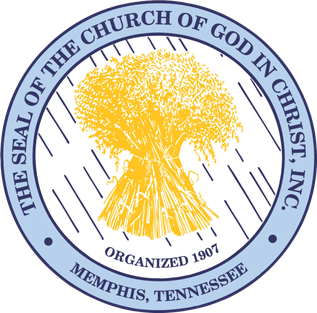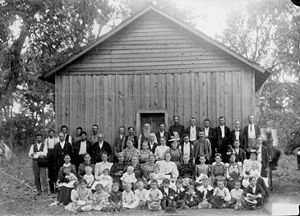Congregational polity, or congregationalist polity, often known as congregationalism, is a system of ecclesiastical polity in which every local church (congregation) is independent, ecclesiastically sovereign, or "autonomous". Its first articulation in writing is the Cambridge Platform of 1648 in New England.

The Christian Church (Disciples of Christ) is a mainline Protestant Christian denomination in the United States and Canada. The denomination started with the Restoration Movement during the Second Great Awakening, first existing during the 19th century as a loose association of churches working towards Christian unity, then slowly forming quasi-denominational structures through missionary societies, regional associations, and an international convention. In 1968, the Disciples of Christ officially adopted a denominational structure at which time a group of churches left to remain nondenominational.

The Church of God in Christ (COGIC) is an international Holiness–Pentecostal Christian denomination, and a large Pentecostal denomination in the United States. Although an international and multi-ethnic religious organization, it has a predominantly African-American membership based within the United States. The international headquarters is in Memphis, Tennessee. The current Presiding Bishop is Bishop John Drew Sheard Sr., who is the Senior Pastor of the Greater Emmanuel Institutional Church of God in Christ of Detroit, Michigan. He was elected as the denomination's leader on March 27, 2021.
Parachurch organizations are Christian faith-based organizations that work outside and across denominations to engage in social welfare and evangelism. Parachurch organizations seek to come alongside the church and specialize in things that individual churches may not be able to specialize in by themselves. They often cross denominational and national boundaries providing specialized services and training.

Chi Alpha | ΧΑ, is an international and interdenominational, coeducational Christian fellowship, social club, student society, and service organization founded in 1953 on the campus of Missouri State University in Springfield, Missouri. Chi Alpha is sponsored by the Assemblies of God USA, a Pentecostal denomination established in 1914.

The Young People's Society of Christian Endeavor was founded in Portland, Maine, in 1881 by Francis Edward Clark, as an interdenominational Christian youth society encouraging them to "work together to know God in Jesus Christ". Operating internationally as World's Christian Endeavor Union, the society's professed objective is "to promote an earnest Christian life among its members, to increase their mutual acquaintanceship, and to make them more useful in the service of God."
Pilgrim Holiness Church (PHC) or International Apostolic Holiness Church (IAHC) is a Christian denomination associated with the holiness movement that split from the Methodist Episcopal Church through the efforts of Martin Wells Knapp in 1897. It was first organized in Cincinnati, Ohio, as the International Holiness Union and Prayer League (IHU/IAHC). Knapp, founder of the IAHC, ordained and his Worldwide Missions Board sent Charles and Lettie Cowman who had attended God's Bible School to Japan in December 1900. By the International Apostolic Holiness Churches Foreign Missionary Board and the co-board of the Revivalist the Cowmans had been appointed the General Superintendents and the Kilbournes the vice-General Superintendent for Korea, Japan and China December 29, 1905. The organization later became the Pilgrim Holiness Church in 1922, the majority of which merged with the Wesleyan Methodists in 1968 to form the Wesleyan Church.
In Christianity, ministry is an activity carried out by Christians to express or spread their faith, the prototype being the Great Commission. The Encyclopedia of Christianity defines it as "carrying forth Christ's mission in the world", indicating that it is "conferred on each Christian in baptism." It is performed by most Christians. This is distinguished from the "office of minister", to which specific individuals who feel a certain vocation. It can signify this activity as a whole, or specific activities, or organizations within a church dedicated to specific activities. Some ministries are identified formally as such, and some are not; some ministry is directed towards members of the church, and some towards non-members. See also Apostolates.
Inter-generational or intergenerational ministry is a model of Christian ministry which emphasizes relationships between age groups and encourages mixed-age activities.

The phrase Catholic youth work covers a wide range of activities carried out with young people, usually in the name of the Catholic Church and with the intention of imparting the Catholic faith to them and inviting them to practice and live out the faith in their lives. Activities in the field range from small scale youth groups attached to parishes or Catholic schools, to large international gatherings, such as World Youth Day. It is a field which has evolved much over recent decades, especially in comparison to more formal methods of education or catechesis within the church. Nearly all dioceses and a great deal of parishes have some form of youth provision running, although a great deal of areas particularly in the developed world are finding youth work both more difficult and rare as the numbers of young people regularly practicing the Catholic faith continue to decline. In contrast, though, the new and exciting developments of recent decades and particularly the influence of the new movements within the Church are ensuring that youth work continues to be an active and fruitful field.

The American Church in Paris was the first American church established outside the United States. It traces its roots back to 1814, and the present church building - located at 65 Quai d'Orsay in the 7th arrondissement of Paris, France - dates to 1931.
Youth ministry, also commonly referred to as youth group, is an age-specific religious ministry of faith groups or other religious organizations, usually from ages 12 to 30, whose mission is to involve and engage with young people who attend their places of worship, or who live in their community. Christian youth ministry usually encompasses one or more of the following:
Wesley Biblical Seminary is a private seminary in the Methodist (Wesleyan-Arminian) tradition in Ridgeland, Mississippi. It was founded in 1974 and serves men and women who come from thirty denominations from all across the United States and other countries. WBS is fully virtual offering polysynchronous online learning with headquarters located outside Jackson, Mississippi.

The Assemblies of God USA (AG), officially The General Council of the Assemblies of God, is a Pentecostal Christian denomination in the United States and the U.S. branch of the World Assemblies of God Fellowship, the world's largest Pentecostal body. The AG reported 2.9 million adherents in 2022. In 2011, it was the ninth largest Christian denomination and the second largest Pentecostal denomination in the United States. The Assemblies of God is a Finished Work denomination, and it holds to a conservative, evangelical and classical Arminian theology as expressed in the Statement of Fundamental Truths and position papers, which emphasize such core Pentecostal doctrines as the baptism in the Holy Spirit, speaking in tongues, divine healing and the Second Coming of Jesus Christ.

Protestants in Thailand constitute about 0.77% of the population of Thailand. Protestant work among the Thai people was begun by Ann Judson in Burma, who evangelized Thai war captives who were relocated to Burma. Protestantism was introduced to the country of Thailand in 1828 through the work of Karl Gutzlaff and Jacob Tomlin, the first two resident Protestant missionaries in Thailand.
In Christianity, a family integrated church is one in which parents and children ordinarily attend church services together; during the service of worship, children and youth stay all through church services and do not attend children's and youth ministries during this time. Other terms used are family discipleship churches, family-centered ministry and inclusive-congregational ministry.

The National Council of Congregational Churches of the United States was a mainline Protestant, Christian denomination in the United States. Its organization as a denomination was delayed by the Civil War. Congregational leaders met again in Boston, Massachusetts in 1865, where they began to hammer out standards of church procedures (polity) and adopted a statement of faith, known as the Burial Hill Declaration. Denominational organization came in 1871 with formation of the National Council of Congregational Churches, which existed until its merger in 1931. In 1928, there were 5,497 Congregational churches in the U.S. with a membership of 939,130. These churches were served by 5,648 ministers.

Earl Frank Palmer was an American Presbyterian minister and Reverend. He served in pastoral ministries at University Presbyterian Church in Seattle, Union Church in Manila, First Presbyterian Church of Berkeley, and The National Presbyterian Church in Washington, D.C. Palmer was known for his expositional preaching and teaching style. He had a strong interest in pursuing theological themes that are present in classic and contemporary literature, with focus on authors such as C.S. Lewis, J.R.R. Tolkien, Karl Barth, and Dietrich Bonhoeffer. Palmer wrote over 20 books, and served on the boards of Princeton Theological Seminary, New College Berkeley, Whitworth University and Regent College.










